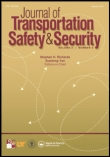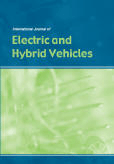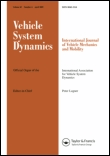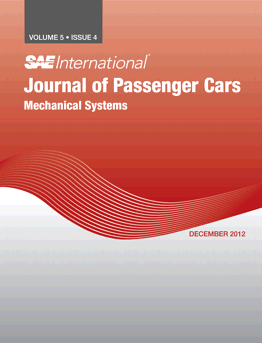
Automotive Innovation
Scope & Guideline
Accelerating Research for a Sustainable Automotive Future
Introduction
Aims and Scopes
- Connected and Automated Vehicle Technologies:
Research on the integration of connectivity and automation in vehicles, including cooperative control strategies, vehicle-to-everything (V2X) communication, and decision-making algorithms for autonomous driving. - Energy Management Systems:
Studies focused on optimizing energy usage in vehicles, particularly in hybrid and electric vehicles, including battery management, fuel cell technologies, and energy-efficient driving strategies. - Advanced Materials and Manufacturing Techniques:
Exploration of new materials and manufacturing processes that enhance vehicle performance, safety, and sustainability, such as lightweighting, additive manufacturing, and novel bonding techniques. - Human Factors and Driver Behavior:
Investigations into human-machine interactions, driver behavior modeling, and the psychological aspects of driving, particularly in the context of automated vehicles. - Cybersecurity and Safety in Automotive Systems:
Research addressing the vulnerabilities in vehicle systems, focusing on cybersecurity measures, fault diagnosis, and resilient control strategies to ensure safe operation.
Trending and Emerging
- Artificial Intelligence and Machine Learning Applications:
There is a growing trend towards the use of AI and machine learning techniques for various automotive applications, including trajectory prediction, decision-making algorithms for autonomous vehicles, and optimization of energy management systems. - Vehicle-to-Everything (V2X) Communication:
The integration of V2X technologies is increasingly prominent, highlighting the need for robust communication frameworks that enhance vehicle safety, traffic management, and cooperative driving. - Sustainability and Environmental Impact:
Research focusing on sustainable practices, such as low-carbon technologies, environmentally-friendly materials, and energy-efficient vehicle systems, is gaining traction in response to global sustainability goals. - Autonomous Vehicle Control and Safety Mechanisms:
Innovative approaches to enhance the safety and reliability of autonomous vehicles, including new algorithms for safe path planning and control strategies, are emerging as critical areas of research. - Human-Machine Interaction and User Experience:
A notable increase in studies examining the interaction between drivers and automated systems, with a focus on user experience, trust, and behavior in mixed traffic environments.
Declining or Waning
- Conventional Internal Combustion Engine Optimization:
Research focused on enhancing performance and efficiency of traditional combustion engines has decreased as the industry rapidly shifts towards electrification and alternative powertrains. - Basic Mechanical Systems Analysis:
While foundational research remains important, there has been a noticeable reduction in papers emphasizing basic mechanical systems analysis, as attention moves toward integrated and complex systems involving electronics and software. - Traditional Vehicle Safety Tests:
The focus on conventional safety testing methodologies is waning, likely due to advancements in simulation technologies and the shift to automated and intelligent safety systems.
Similar Journals

Journal of Transportation Safety & Security
Exploring innovations for secure travel.The Journal of Transportation Safety & Security (ISSN: 1943-9962; E-ISSN: 1943-9970), published by Taylor & Francis Inc, stands as a pivotal resource for professionals and researchers in the fields of safety research and transportation. Since its inception in 2009, this journal has delivered rigorous peer-reviewed articles that explore critical issues relating to safety and security within the transportation sector. With an impressive impact factor reflecting its scholarly significance—ranking Q1 in Safety Research and Q2 in Transportation as of 2023—this journal occupies a unique position in the academic landscape, encouraging innovation and collaboration among researchers dedicated to improving safety measures. The Scopus rankings further affirm its status, placing it 17th out of 109 in Safety Research and 49th out of 141 in Transportation. Readers can expect contemporary discussions and comprehensive reviews tailored to both practitioners and academics alike, effectively bridging the gap between theory and application. Explore the Journal of Transportation Safety & Security to contribute to a safer and more secure transportation environment.

SAE International Journal of Vehicle Dynamics Stability and NVH
Driving Innovation in Automotive Engineering and BeyondSAE International Journal of Vehicle Dynamics Stability and NVH is a prestigious publication dedicated to advancing knowledge in the domains of automotive engineering, computational mechanics, control and optimization, and mechanical engineering. Published by SAE International, this journal boasts an impressive impact factor within its category, achieving a Q1 ranking in 2023 across multiple fields, including automotive engineering and computational mechanics. With ISSN 2380-2162 and E-ISSN 2380-2170, it serves as a crucial platform for the dissemination of innovative research and technological advancements in vehicle dynamics and noise, vibration, and harshness (NVH) analysis. Researchers, professionals, and students benefit from the journal's rigorous peer-review process and its commitment to high-quality publications. With a wide-reaching influence and an emphasis on interdisciplinary approaches, the journal is pivotal for those seeking to contribute to the evolution of vehicle technology and related areas.

MM Science Journal
Fostering Innovation in the Heart of Engineering Sciences.MM Science Journal is a leading publication in the fields of Automotive Engineering, Electrical and Electronic Engineering, Industrial and Manufacturing Engineering, and Mechanical Engineering, published by MM SCIENCE. Established in 2014 and spanning a converged period to 2024, this journal serves as a crucial platform for disseminating innovative research and practical applications relevant to industry professionals and academic scholars alike. With a notable Q3 ranking in multiple engineering categories and Scopus Ranks placing it in the 35th to 25th percentiles across various disciplines, MM Science Journal is committed to advancing knowledge and fostering collaboration in engineering disciplines. Although not currently an open-access publication, the journal remains instrumental for those seeking to engage with cutting-edge developments in engineering from its base in the Czech Republic. Researchers, students, and professionals are encouraged to explore the rich findings shared within its pages, contributing to the ongoing evolution of engineering practices.

International Journal of Electric and Hybrid Vehicles
Advancing the Future of Electric and Hybrid VehiclesThe International Journal of Electric and Hybrid Vehicles, published by INDERSCIENCE ENTERPRISES LTD, serves as a pivotal platform for scholarly discourse within the automotive engineering and renewable energy sectors. Established in 2007, this journal focuses on advancing research related to electric and hybrid vehicle technologies, encompassing innovations in design, performance, and environmental sustainability. With its rankings reflecting a Q3 status in Automotive Engineering and Fuel Technology, along with a Q4 in Renewable Energy, Sustainability and the Environment, it occupies a significant space within the academic community. Researchers, professionals, and students can benefit from its comprehensive coverage of theoretical and practical applications. Though not open access, its articles contribute valuable insights and advancements that drive the global transition towards greener transportation solutions. As the journal converges towards its 2024 goal, it remains committed to the dissemination of high-quality research that shapes the future of sustainable mobility.

MECHANICAL ENGINEERING
Elevating Engineering Discourse for a Sustainable FutureMECHANICAL ENGINEERING, published by the esteemed American Society of Mechanical Engineers (ASME), is a vital resource for professionals and researchers in the field of mechanical engineering. With a rich history that spans several decades, this journal has been pivotal in disseminating innovative research and advancements from 1968 to 1998 and from 2002 to 2024, fostering a deeper understanding of complex engineering principles. Although currently not an open access journal, it offers subscription-based access to its high-quality articles, enhancing the field's scholarship. As evidenced by its Q4 ranking in mechanical engineering and a current Scopus rank of #580 out of 672, MECHANICAL ENGINEERING serves as a platform for valuable contributions, albeit it is positioned among its peers within the 13th percentile. This journal is a beacon for those committed to staying at the forefront of mechanical engineering research and practice, encouraging discourse that shapes the future of the discipline.

ITE JOURNAL-INSTITUTE OF TRANSPORTATION ENGINEERS
Bridging Research and Practice in Transportation EngineeringITE JOURNAL - INSTITUTE OF TRANSPORTATION ENGINEERS is a distinguished publication that serves as a vital resource in the fields of Automotive Engineering and Mechanical Engineering, bridging the gap between research and practical application in transportation systems. Published by the Institute of Transportation Engineers in the United States, this journal has been contributing to the academic discourse since 1978 and continues to be a relevant platform for innovative research and insights. The journal currently holds a Q4 ranking in both Automotive Engineering and Mechanical Engineering categories, reflecting its niche but impactful presence in the Scopus database. Although the journal is not open access, it remains a critical outlet for researchers and professionals looking to advance their knowledge and influence practices in transportation engineering. With its commitment to disseminating quality research, the ITE Journal is a must-read for anyone involved in the transportation sector seeking to stay ahead in this dynamic field.

INTERNATIONAL JOURNAL OF AUTOMOTIVE TECHNOLOGY
Pioneering Research for a Sustainable Automotive FutureINTERNATIONAL JOURNAL OF AUTOMOTIVE TECHNOLOGY, published by the Korean Society of Automotive Engineers (KSAE), stands as a key platform in the field of Automotive Engineering since its inception in 2000. With an ISSN of 1229-9138 and an E-ISSN of 1976-3832, this esteemed journal aims to disseminate cutting-edge research, innovative methodologies, and advancements in automotive technology. As of 2023, it holds a distinguished Q2 quartile ranking in the Automotive Engineering category on Scopus, featuring a competitive rank of 48/125, illustrating its recognition among peers and the academic community. The journal also enjoys a global readership despite its base in South Korea. Researchers, professionals, and students in the automotive sector are encouraged to contribute to this journal, thus promoting collaboration and knowledge exchange that fosters innovation and progress in automotive engineering. Additionally, the journal is committed to enhancing accessibility of knowledge across boundaries and aims to continue serving as a catalyst for academic growth up to the year 2024.

VEHICLE SYSTEM DYNAMICS
Advancing automotive excellence through cutting-edge research.VEHICLE SYSTEM DYNAMICS, published by Taylor & Francis Ltd, is a premier journal dedicated to advancing the field of automotive and mechanical engineering. With an impressive impact factor and categorized in the top quartiles (Q1) of Automotive Engineering, Mechanical Engineering, and Safety, Risk, Reliability, and Quality, this journal has established itself as a vital resource for researchers, industry professionals, and academics alike. Spanning from 1972 to 2024, VEHICLE SYSTEM DYNAMICS focuses on disseminating high-quality, peer-reviewed research that addresses critical challenges and innovations in vehicle dynamics and system performances. The journal is based in the United Kingdom and continues to contribute significantly to the global discourse on safe and efficient vehicle design and operation. Readers can access the journal's content through various platforms, ensuring the latest research is readily available to inform and inspire future advancements in the field.

SAE International Journal of Commercial Vehicles
Exploring the Future of Commercial Vehicle TechnologySAE International Journal of Commercial Vehicles, published by SAE International, stands at the forefront of automotive engineering research, fostering innovation and development in the commercial vehicle sector. With an ISSN of 1946-391X and an E-ISSN of 1946-3928, the journal plays a critical role in disseminating high-quality research, theoretical advancements, and practical applications across various facets of commercial vehicles. As part of the notable SAE publication portfolio, it enjoys a respectable 2023 Q3 ranking within the automotive engineering category and holds a significant position at Rank #72/125 in Scopus, reflecting its growing impact and relevance. The journal's themes encompass innovative technologies, safety advancements, and regulatory developments, providing researchers and industry professionals with vital insights essential for tackling contemporary challenges. Though currently not an open-access publication, its contribution to the engineering community is invaluable, paving the way for future studies and collaborative efforts in the automotive field.

SAE International Journal of Passenger Cars-Mechanical Systems
Exploring the Future of Passenger Car DynamicsSAE International Journal of Passenger Cars-Mechanical Systems, published by SAE International, serves as a vital platform for researchers, engineers, and industry professionals focused on the dynamics of passenger vehicle mechanical systems. With an ISSN of 1946-3995 and E-ISSN of 1946-4002, this journal bridges academic research with practical applications in the automotive field. Although coverage in Scopus was discontinued after 2021, the journal has still contributed significantly to the realms of automotive engineering, safety, and mechanical engineering, evidenced by its Scopus rankings and percentiles across various categories, including a rank of #57 in Automotive Engineering. This multidisciplinary journal is key for those looking to advance their knowledge and explore innovative solutions in automotive mechanics, with an emphasis on enhancing vehicle performance, reliability, and safety. While current open access options are detailed further on their website, the journal continues to maintain a commitment to disseminating valuable insights that can shape future automotive technologies and practices.